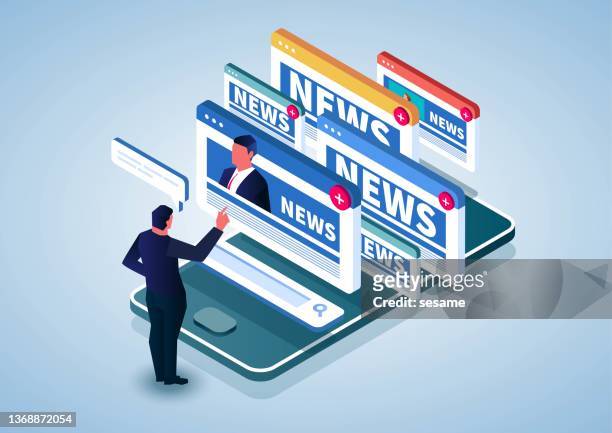The Journalist’s Guide to Publishing on stnews.live and Engagement
The Importance of Fact-Checking on the planet of News Online
The occurrence of false information in today's on-line news landscape has actually reached startling degrees. Fact-checking organizations play a crucial function in combating this pattern. They confirm cases and enhance the integrity of journalism. Nonetheless, the effectiveness of these organizations typically rests on their methodologies and public assumption. As target markets navigate this complicated setting, the effects of their searchings for might form the future of news usage and count on. What does this mean for the stability of information relocating ahead?

The Increase of False Information in the Digital Age
Just how has the arrival of electronic modern technology added to the spread of misinformation? The fast development of the internet and social networks platforms has assisted in the dissemination of details at an unmatched rate. Customers can share posts, videos, and opinions with a plain click, commonly without confirming the web content's accuracy. Formulas focus on spectacular or mentally charged material, bring about a spreading of deceptive stories that record interest.
Additionally, the privacy managed by digital systems enables people to spread out incorrect details without liability (stnews.live). False information thrives in resemble chambers, where individuals are exposed mostly to perspectives that strengthen their ideas, further lodging fallacies. The saturation of details can overwhelm individuals, making it testing to recognize qualified resources from undependable ones. False information has actually become a prevalent issue in the digital landscape, impacting public point of view and trust in legitimate news sources.
The Role of Fact-Checking Organizations
Fact-checking companies play an important role in enhancing the credibility of journalism by validating cases made in report. Their initiatives are crucial in combating misinformation, making certain that accurate details prevails in the electronic landscape. By holding media electrical outlets accountable, these companies add considerably to educated public discussion.
Enhancing Reliability in Journalism
While misinformation multiplies in the electronic age, fact-checking companies play a crucial duty in enhancing the credibility of journalism. These organizations carefully confirm claims made in newspaper article, public statements, and social media blog posts, making sure that information disseminated to the general public is precise and trustworthy. By giving independent assessments, they work as an important source for reporters, helping them maintain high standards of integrity. Furthermore, their efforts advertise transparency in media, cultivating public trust. As audiences end up being significantly discerning, the existence of reliable fact-checking entities can differentiate reputable news resources from those that might spread falsehoods. Ultimately, the commitment of fact-checking organizations to promote truthfulness is crucial for the health and wellness of autonomous discussion.
Combating False Information Effectively
As misinformation proceeds to spread out swiftly across electronic platforms, the duty of fact-checking organizations becomes increasingly critical in the battle for exact info. These organizations function as watchdogs, scrutinizing claims made by somebodies and media electrical outlets to guarantee accountability. By utilizing strenuous study methods and specialist evaluation, they confirm realities and clear up misleading stories. Their findings are disseminated through different networks, educating the general public and promoting vital reasoning. On top of that, partnerships with social media sites systems enhance their reach, enabling timely flagging of incorrect details. As electronic proficiency expands, the impact of fact-checking organizations is important in equipping target markets to discern fact from falsehood, inevitably contributing to a much more enlightened society.
Exactly How False Information Affects Public Assumption
False information significantly weakens count on in media, leading target markets to wonder about the reliability of news sources. Because of this, people commonly move towards outlets that enhance their existing beliefs, contributing to the polarization of opinions. This vibrant creates a fragmented information landscape, where shared comprehending becomes progressively challenging to achieve.
Count on Media

Rely on media has actually come to be increasingly fragile in the digital age, where the fast spread of false info can alter public understanding. As false information proliferates throughout social media and on-line platforms, target markets commonly find it challenging to discern trustworthy sources from unreliable ones. This unpredictability fosters suspicion, leading many individuals to examine the motives behind news reporting. Count on in established media electrical outlets has lessened, as consumers progressively transform to alternate resources that may lack strenuous content criteria. This disintegration of depend on not only impacts specific beliefs however additionally undermines the collective capacity to participate in notified discussions. Eventually, the honesty of journalism goes to risk, highlighting the critical requirement for reliable fact-checking to restore self-confidence in the media landscape.

Polarization of Point of views
The increasing uncertainty towards conventional media has actually contributed to an expanding polarization of opinions amongst the general public. False information, frequently disseminated through social networks and online platforms, plays a considerable function in shaping distinct ideological divides. Individuals regularly choose info that lines up with their pre-existing ideas, reinforcing their perspectives while dismissing opposing viewpoints. This resemble chamber impact increases departments, causing a fragmented public discourse where consensus comes to be progressively elusive. Additionally, sensationalized stories prosper in this atmosphere, further skewing public perception and fostering question in reliable resources. As polarization rises, the requirement for reliable fact-checking becomes paramount to bridge gaps and advertise informed discussions, ultimately making certain a much more cohesive society with the ability of maneuvering complex concerns.
Techniques for Efficient Fact-Checking
Effective fact-checking relies upon a methodical method that includes thorough research, confirmation of resources, and essential analysis of cases. A fundamental technique is cross-referencing info from several legitimate resources to verify its precision. Fact-checkers usually make use of specialized data sources and archives to map the origin of particular declarations, making sure that the reported information lines up with recorded evidence.
An additional necessary method includes looking at the context in which cases are presented. Misleading details can arise from out-of-context quotes or selective information use. By analyzing the broader narrative, fact-checkers can determine possible prejudices or false impressions.
Moreover, engaging with experts in pertinent areas can supply clearness and understanding that boosts the fact-checking process. This cooperation can uncover subtleties that laypeople might ignore - stnews.live. Inevitably, a self-displined method integrating these techniques cultivates an extra educated public, enhancing the integrity of details shared in the electronic age
The Impact of Social Media on News Intake
Exactly how has social media sites changed the means people take in news? The introduction of systems like Facebook, Twitter, and Instagram has notably modified news intake patterns. News is now distributed swiftly, permitting customers to gain access to real-time updates and engage with content through sort, shares, and remarks. This immediacy has actually fostered a choice for bite-sized information, you could try these out typically at the expenditure of in-depth evaluation.
In addition, social media sites allows personalized news feeds, where algorithms curate material based upon customer choices, developing echo chambers that may limit exposure to varied point of views. The duty of typical news outlets has diminished as people progressively rely upon peer referrals and trending subjects. The reputation of information is often endangered, as sensationalism can outweigh valid reporting. In general, social media sites has actually reshaped news usage, highlighting you could try here rate and personalization while testing the requirements of journalistic stability.
Encouraging Audiences to Determine Trustworthy Resources

In addition, examining the authorship and organizational history of newspaper article can reveal possible biases. Cross-referencing info across several respectable outlets additionally enhances the confirmation procedure. Making use of electronic devices, such as browser expansions that rank the integrity of web sites, can likewise assist in determining trustworthy info. By actively engaging with these resources and cultivating an essential mindset, audiences can much better furnish themselves to discern dependable news sources, ultimately fostering an extra informed culture among the complexities these days's media atmosphere.
The Future of Journalism and Fact-Checking
As the media landscape advances, the future of journalism and fact-checking deals with both tests and possibilities. The surge of digital systems has actually equalized info dissemination, allowing diverse voices to arise. However, this has additionally resulted in the expansion of false information, demanding durable fact-checking systems. Journalists will significantly count on innovation, including AI devices, to validate truths swiftly and effectively.
Cooperation between news companies and fact-checking entities is anticipated to strengthen reputation and openness. Target market engagement will certainly play a crucial duty, as informed viewers become considerable partners in identifying credible content.
The demand for liability and accuracy is likely to grow, pressing reporters to maintain high requirements in their coverage. Eventually, the future of journalism might pivot on its capability to adjust to technological innovations while maintaining journalistic honesty, guaranteeing that fact-checking remains a keystone of qualified news.
Regularly Asked Questions
Just How Can I Report False Information I Come Across Online?
To report false information come across online, people can use platform-specific reporting devices, give clear evidence, and share the information with fact-checking organizations. Engaging with neighborhood conversations can likewise help increase recognition regarding the false information.
What Are Usual Indicators of Misinformation in News Articles?
Typical indications of misinformation in newspaper article Click Here include spectacular headings, lack of legitimate resources, psychological language, inconsistent realities, and absence of writer qualifications. Visitors ought to critically evaluate content for these indicators to discern precision.
Exactly How Do Fact-Checkers Verify Sources?
Fact-checkers confirm resources by cross-referencing info with trustworthy data sources, getting in touch with specialists, and analyzing the original context of cases. They additionally examine the dependability of the resources, guaranteeing accurate and trustworthy information for public intake.
What Lawful Activities Can Be Taken Against Misinformation?
Legal activities versus false information might consist of libel suits, cease-and-desist orders, and regulative penalties. Targets can seek remedy with civil courts, while some territories impose fines or permissions on systems disseminating false details.
Are There Apps for Fact-Checking News On-The-Go?
Numerous apps exist for fact-checking news on-the-go, including Snopes, FactCheck.org, and PolitiFact. These applications help individuals confirm insurance claims quickly, advertising informed decision-making and promoting a much more discerning technique to consuming news in real-time.